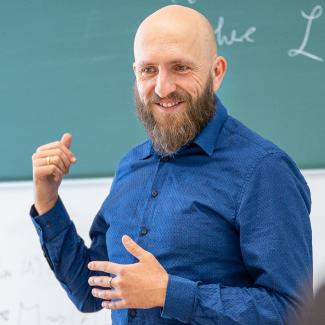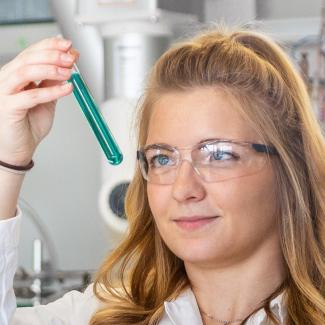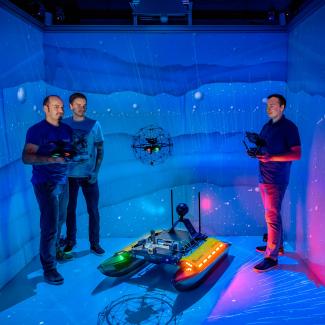Sustainable and Innovative Natural Resource Management - SINReM
SINReM is a two-year Master's programme comprising 120 ECTS credits and taught in English. It is organised by the University of Ghent in Belgium (as coordinating university), TU Bergakademie Freiberg in Germany and Uppsala University in Sweden. The successful participant will receive the joint degree International Master of Science in Sustainable and Innovative Natural Resource Management. The programme has been awarded the EIT label, a seal of quality awarded by the European Institute of Innovation and Technology to the best Master's and PhD programmes.
The programme focuses on the innovative and sustainable production, extraction and management of primary and secondary resources. The curriculum covers mining, exploration and extraction processes through to recovery and recycling technologies (e.g. clean technologies, CO2-neutral recovery of resources from wastewater and waste streams). SINReM's range of topics also combines scientific and technical areas with economic, ecological and entrepreneurial aspects. Technological feasibility, sustainability and the circular economy are given great attention in the holistic teaching and learning processes.
The full SINReM programme, including the list of courses, is available at https://sinrem.eu/program.
In the first year, the students study together at Ghent University (welcome, courses in circular economy, clean technology, resource recovery technologies, etc.), at TU Bergakademie.), at TU Bergakademie Freiberg (introductory course on the entire process chain of rare resources, in the summer the module "Resource Chemistry") and at Uppsala University (advanced courses on raw materials, innovation management and entrepreneurship, etc.).
In the second year, students choose one of four specialisations that are taught at one of the partner universities: at Ghent University: Circular societies; at Uppsala University: Georesource Exploration or Sustainable Entrepreneurship; and at TU Bergakademie Freiberg: Sustainable Processes.
Majors
Sustainable processes
The Sustainable Processes major at TU Freiberg focuses on the various stages of the mineral processing process: from the exploration of new deposits and the development of alternative energy technologies and materials to the recycling and management of resources. TU Freiberg is the only European university to operate its own underground research and teaching mine and the oldest mining university in the world. TU Freiberg is involved in interdisciplinary research projects such as in-situ bioleaching and the refinement of strategically important metals such as indium and germanium (particularly relevant as both elements were discovered at TU Freiberg). Where possible, the results of the research projects are commercialised through start-up companies, such as PARFORCE, which produces phosphoric acid from waste materials.
Master's thesis projects can come from a variety of fields, but should focus on the scientific and/or engineering aspects of materials processing. At the Chair of Mineral Processing Machines, the comminution and sorting of raw materials can be investigated. Thanks to the large number of industrial partners, students can carry out experimental investigations on full-scale industrial machines. In the Chemical Technology, Inorganic Chemistry and Biology departments, hydro- and biohydrometallurgical mineral leaching and recycling processes are developed to extract strategically important metals from primary sources or secondary raw materials such as overburden and spent batteries. Two start-up companies have emerged from this research in recent years. The treatment of aqueous process streams can be investigated in the Process Engineering department. Among other things, research focuses on the selective separation of strategically important elements from polymetallic streams using membrane techniques. Non-ferrous metallurgy is concerned with the development of electrowinning and refining processes as well as pyrometallurgical methods on a laboratory and pilot plant scale.
Through industrial cooperation, there is the opportunity to complete a Master's thesis at partner institutions such as one of the nationwide Helmholtz Centres or at companies such as Aurubis, the largest copper producer in Europe. TU Freiberg also has close links with the manufacturing industry, enabling students to produce end products such as sensors and semiconductor technologies that are relevant to the mining and recycling sector.
Exploration of georesources
The major Exploration of georesources offered at Uppsala University includes cutting-edge research in the fields of geophysical and mineralogical-geochemical exploration of mineral deposits. Uppsala University has expertise in mineralogy, petrology and geochemistry applied to mineralisation and ore deposits as well as mine waste with regard to critical elements. SMART Exploration, a Horizon 2020 project (https://smartexploration.eu/), focuses on innovative developments in geophysics with application to the mining industry. The researchers are developing 3D geophysical models of ore deposits and investigating the role of the physical properties of the rocks. The collaboration ensures the integration of geophysical results into the broader context of geological and mineralogical perspectives. Research into induced seismicity is aimed at the dangers of mining, while others are concerned with questions of sustainability. From an environmental perspective, researchers are involved in projects such as NITREM (https://eitrawmaterials.eu/project/nitrem/), which investigates the recovery of nitrogen from mining waste. Other researchers are involved in understanding the mineral supply chain as well as sustainable development related to mines and mining.
The master's thesis should focus on geological, geochemical or geophysical exploration, including mineralogy, critical minerals and metals. Other aspects include primary resource management (mines and exploration sites), urban mining and mineral supply, environmental aspects of mining and environmental baselines for potential mine sites, and sustainable development issues related to mining and mines.
Circular societies
The major Circular societies offered at Ghent University focuses on re-engineering the value chain as well as designing sustainable processes, systems and new business models for evolving towards a circular society. Therefore, data on e.g. flows of materials within the society are collected, analysed, and processed, and the sustainability of these novel processes and systems is assessed. Prevention of waste generation is targeted, and generated wastes are explored as potential new resources. Hence, students also focus on the application and development of resource recovery and recycling technologies and the development of more sustainable materials in order to make the raw materials value chain more sustainable. Particular attention goes to the management of societal changes, aligned with the sustainable development goals.
The master dissertation should fit into this scope. Mandatory courses deal with sustainable management of resources in the circular economy (including e.g. industrial symbiosis). Elective courses focus on e.g. life cycle assessment, environmental legislation, sustainable waste(water) treatment, resource recovery, mobility & transport, innovative materials, or renewable energy.
Sustainable entrepreneurship
The Sustainable Entrepreneurship major at Uppsala University offers teaching and training to become an entrepreneur and to understand the nature of sustainable business development in general as well as in established companies. Teaching is organised in the form of joint courses with students from the international Master's degree programme Sustainable Destination Development, which offers numerous opportunities for learning synergies. The Sustainable Entrepreneurship specialisation comprises two courses, the first of which deals with models for sustainable entrepreneurship, which are critically examined by the students from a sustainability perspective. The second course focuses on the application of these models in real business situations and offers the opportunity to specialise in different aspects of sustainable business development. Students work in groups with assignments designed to illustrate important and critical sustainability challenges in the extractive industry. Company visits and several guest lectures from industry and academia characterise the teaching as well as individual assignments and mentoring.
The Master's thesis can either focus on the start-up of a company in the extractive industry and cover the aspects of market research, co-creation and financing when founding a new company, or make a contribution to sustainable technology and business development in an established company. Every autumn, interested companies or research groups from partner universities are invited to submit project proposals to students on the Sustainable Entrepreneurship course. The students then choose between these alternatives for their final thesis.
- Faculty
-
Faculty of Chemistry, Physics and Bioscience (Faculty 2)
- Degree
-
Master of Science (M. Sc.)
- Standard period of study
-
4 Semester
- Part-time possible
-
No
- Start of studies
-
Winter semester
- Dual Degree Description
-
Joint Master's degree from TU Bergakademie Freiberg, Ghent University and Uppsala University
- Admission requirement
-
- A first professionally qualifying university degree in a comparable
course of study such as engineering or in the natural sciences, e.g. physics, chemistry, biology, mathematics, geosciences, materials science including at least 15 ECTS in mathematics and/or physics and at least 10 ECTS in general chemistry or applied
chemistry at another recognised university or a recognised engineering college.
Language skills
Accepted certificates:
- TOEFL test
- Academic IELTS test
- Cambridge Certificate of Advanced English (CAE)
- English Language of Instruction Certificate (only for certain countries!)
For details, please visit the SINReM website.
- A first professionally qualifying university degree in a comparable
- Course language
-
English
As a resource engineer, you can pursue an academic career (university or research institute), work as a consultant or set up your own company in the extractive industry.
You could work for the following companies:
- Chemical, exploration and green energy companies;
- Machinery and plant engineering companies;
- Metal processing and ceramics industries;
- Environmental and circular economy sectors, etc.
Why study SINReM at TUBAF
SINReM is a unique degree programme that combines the necessary skills to develop, design and lead sustainable and innovative natural resource management processes. The programme not only provides you with traditional knowledge-based skills, but the structure of the programme teaches you to work in an interdisciplinary and intercultural environment. Through project-based work and collaboration with your international peers, you will acquire all the skills you need to start your professional career - in industry, research or as an entrepreneur. Throughout your degree programme, you can gain initial experience through internships and specialist lectures from industry.
Prerequisites for the programme
SINReM is particularly suitable for (but not limited to): Chemical Engineers, Chemists, Environmental Scientists and Engineers, Geologists, Geophysicists, Mining Engineers, Mineralogists, Materials Scientists, Metallurgists, Bioscience Engineers, Biotechnologists and Process Engineers.
In order to SINReM programme, you must:
- have a Bachelor's degree (equivalent to at least 180 ECTS*) in a subject closely related to the SINReM programme (see above for examples);
- have a solid science background (equivalent to at least 15 ECTS in mathematics and/or physics and 10 ECTS in chemistry);
- Have completed your previous degree(s) with very good or excellent grades (usually top 30% of students);
- Include a convincing letter of motivation with your application, stating that the SINReM field matches your previous education and future goals;
- Meet the English language requirements.
For full details of the application process, scholarship opportunities and further information, please visit https://sinrem.eu.


